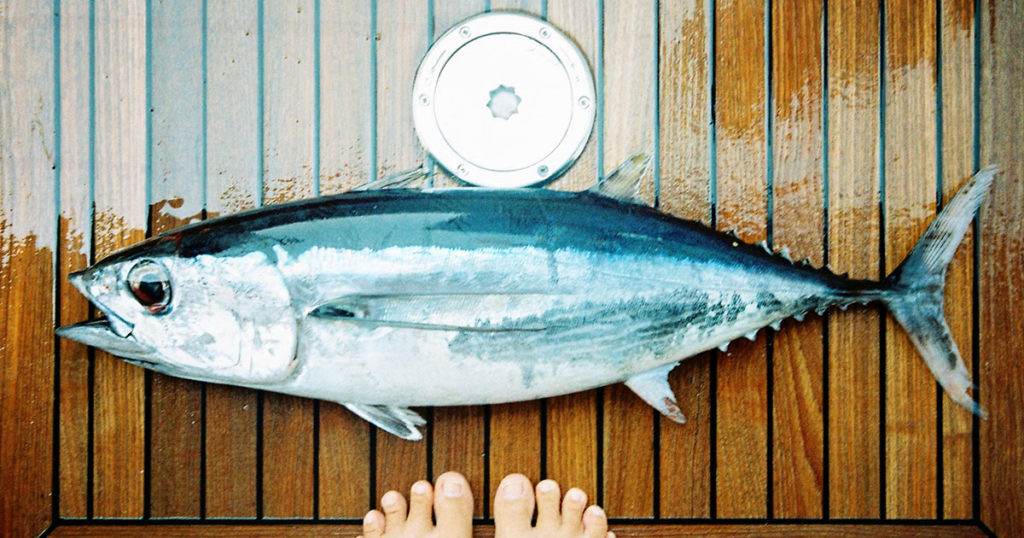
Who might be in my age category, I asked myself, looking around at the other women among the hundred plus runners gathered at the wharf that morning. Some were obviously much younger than I, and some were in my ballpark. But I was exactly the age at which the category opened, a sweet spot, and the question was whether they were younger, even by a trifle, and therefore not rivals, or the same age or older, making them my competitors for the first place prize of a whole, freshly caught tuna. I don’t eat meat, but I do eat fish, and at 20 euros a kilo, a fish that must have weighed seven or eight kilos was a prize worth struggling for. To win is sweet, but to be generously rewarded makes the win even sweeter.
No list of competitors and their categories was posted, so I couldn’t know who was in mine unless I asked the other runners, and though to worry about it seemed natural and understandable, to try to find out and therefore focus my competitive instincts seemed somehow unsporting. As if seeking assurances of the outcome in advance of the event. Isn’t half the point of competing that you don’t know? If you need guarantees, you shouldn’t be there. I’d have been ashamed to ask. So I didn’t. As far as I could guess, three other runners could be in my category of 60-plus, and at the start of the race, I noted where they were positioned in order to keep track of them and run accordingly. That was in theory, anyway.
When the race started, I followed the fastest of the three, quickly outdistancing the other two. The race was a 5K, three laps of a circuit through the installations at the fish market of Avilés at the fishing port, and as I ran, I concentrated on the woman ahead of me. If the race had been varied, with uphills and downhills, I might have observed my rival’s performance on those different terrains and planned accordingly, attacking at her weakest so she couldn’t respond to my challenge. Once I’d captured the lead, then supposedly this other runner wouldn’t have the heart to try to retake it.
But the race was entirely flat. My only hope therefore was that she wouldn’t be able to keep up her pace. When I saw signs of her tiring, then, with a burst of speed, I’d overtake her. After a lap and a half, however, I realized I had no reserves for such a burst and could go no faster. In fact, I was in danger of slowing. That would mean the other competitors might pull ahead.
In this race, with only first place rewarded, it would hardly matter if I lost to one or to three. However, since I couldn’t be sure of who my competitors were, to give up because another runner outstripped me might be throwing in the towel far too soon. All I could do, really, despite my calculations, was run as fast as I could. And I did.
I finished seconds behind the woman I’d been following and minutes ahead of the other two. While I was getting my breath, before the results were posted, the woman who’d finished just ahead of me came over to me. Of course she’d known, as a competent runner would, that I was right on her tail the whole time. She congratulated me on a good race, and I returned the compliment. Then the temptation became just too great, and I asked which category she was in. She told me, and said she thought her time was good for her age. I smiled and nodded in agreement. Not bad, I thought, not bad at all. I kept smiling, because I now knew she had not been a competitor after all, and her time for her age wasn’t as good as mine for my age. And that we’d both be on the podium to receive our first-place prize.
At the prize ceremony, for each winner, male and female, of the different categories and for the three top male and three top female finishers, one of the 16 tunas imbedded in a large crate of ice, head down, was seized by the protruding tail and pulled out, as if from the sea itself. I stood on the podium, arms out, to receive the fish. I watched as it was hauled from the crate, into whose icy depths it appeared to be diving. I didn’t really expect it to twist and struggle, but even so, it was a surprise to see the fish exposed as a dead animal.
I braced my back to hold the fish away from me while people snapped photos. The body was cold and heavy. Then I gingerly stepped down, cradling the fish, to hand it over to be cleaned and cut up for me. Some of the other fish had trickles of blood at the gills or mouth, but mine did not. It did not suggest to me a plate of grilled tuna steaks, tuna fritters, or a bowl of the delicious tuna stew called marmitako. It looked instead like a fellow creature that had given up, a being you wanted to encourage to try harder, to struggle. I didn’t want to eat it—I wanted to free it. Running hard, sweating, panting, gasping, feeling my legs turn into blocks of wood—all that had not been the price to pay. No. The price of winning was dismay at the cost of my success.

